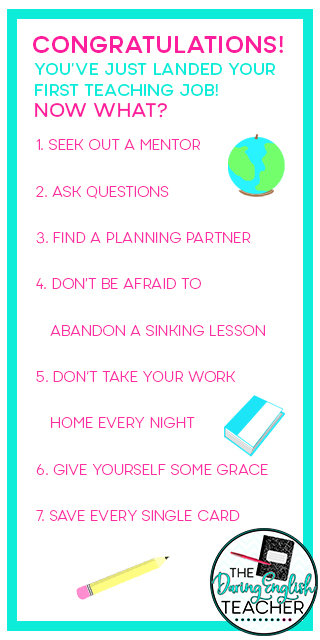Congratulations! You’ve landed your first teaching job. This is such an exciting time, and you should celebrate this occasion. However, if you are anything like me, the very second that happy moment ends and you realize that you are going to have your own classroom with your own students to teach, the panic might set in. So, you’ve landed your first job, now what?
Your first year won’t be easy and carefree, but it shouldn’t be the most stressful year of your entire life. Here are seven tips for first-year teachers.
1. Seek out a mentor
As soon as you sign your contract, ask if your school has mentor teachers on campus. Your mentor could be a department chair, or a grade-level lead, or someone who is in charge of making new teachers feel welcomed. Not every school has a mentorship program in place, so if you are a newly hired first-year teacher at a school that doesn’t have mentors, find one. You’ll probably be introduced to more veteran teachers toward the beginning of the year. Please, do not be afraid to ask questions or ask for help.
2. Ask questions
The beginning of a new school year is a crazy, hectic time for teachers everywhere, rookies and veterans alike. As a veteran teacher, it is so easy to get caught up in the rush of the new school that we often forget how difficult the first year, or first few years, was. We are in such a routine now that we might have forgotten that we once didn’t know how to enter our code into the copier, who to call to ask for some extra bandaids, or where we could get a new stack of hall passes. Trust me; you won’t be bothering anyone if you ask questions.
3. Find a planning partner
Whether you have full reign of your curriculum or if you follow a strict pacing guide, find a planning partner – someone who teaches the same content or grade-level that you do. Planning with someone will help you get a feel for the school and the curriculum pace. Plus, it will save you tons of hours is you share and collaborate.
If you are a secondary ELA teacher and you haven’t found anyone to plan with, I have a free curriculum pacing guide download that I created. As a first-year teacher, I would have loved something like this to use as a starting off point.
4. Don’t be afraid to abandon a sinking lesson
If you talk to other veteran teachers, I am sure they can all say the same thing: Sometimes, lessons don’t go as planned, and it can even happen to the most experienced teachers. Sometimes, the activity doesn’t work. Usually, you can tell if a lesson isn’t working. It is okay to jump ship and pivot during the middle of a lesson. I find that when this happens, it also helps to be transparent with your students. Let them know that things are not working as you imagined and that you are going to switch things up. Being transparent and open allows your students to see you in a new light.
I remember when this happened to me the first time. I think it was my second year of teaching, and I thought I had it a little more together. I planned this -what I thought- fun and engaging activity that required all of my students to participate and move around the room. After I took way too long explaining what to do (that, my friends, was my first clue that the lesson was doomed), my students attempted the activity. Quickly, I saw things fall apart. There was no cohesion and this elaborate activity that -in my mind- seemed like a brilliant idea was quickly unraveling.
I said -something like this- aloud to my kids, “What! This is not what I had in mind. I think I need to go back and revisit this. Let’s stop and do partner work instead.”
This is why it is always wise to have a backup plan. Back during my early years of teaching, EdTech was just emerging. However, today, there’s a plethora of online sites available that serve as perfect back-up plans. One of my favorite go-to sites is CommonLit.org.
5. Don’t take your work home every night
As a new teacher, you are more likely going to have work after your contract hours and take grading home. It’s just how it is, especially if you are a new middle school or high school English teacher and your curriculum requires that you teach a novel in which you’ve never read. I’ve been there. On top of the lesson planning and grading, you also have to read and reread the book to make sure you are always at least a couple of chapters ahead of your students. The workload can quickly become quite burdensome. It’s okay to stay just a few chapters ahead of your students when teaching a new novel. This is why it is so important to have those planning buddies who can help you out.
To help alleviate the stress of the toddler teaching years (you know, years 1-3), try to dedicate one day in the middle of the week to not take home any work. This will help give you some much-needed midweek rejuvenation. That night is yours. Don’t even check your work emails.
6. Give yourself some grace
Teaching is a tough profession, and the first couple of years are by far the most difficult. There’s a reason why the turnover rate is so high and why many new teachers don’t make it to year five. Be sure to give yourself plenty of grace in the classroom. Your teacher ed program and even an entire year of student teaching can’t fully prepare you for your first year of teaching. You will make mistakes. You will second-guess your grading. You will say something in which you immediately regret. You will feel stressed. You might even question if you chose the correct path. And, despite all of this, it will be okay. Those first few years are tough, but it does get easier. The planning, grading, and general pace of teaching come a bit more naturally each year.
7. Save every student card
During my first year, my mentor teacher gave me some of the best advice that I’ve ever received. She told me, “Christina, save all of this in a folder” as she pointed to a student thank you note that I showed her. Ever since my first year of teaching, I’ve saved all of the cards, thank you notes, personalized student doodles, and other memorabilia that remind me of my WHY -why I became a teacher in the first place.
Your first year might be rough, and there will more than likely be some days where you question your career choice, sanity, and ability. Don’t let those days get to you because the good days will outnumber the bad.





